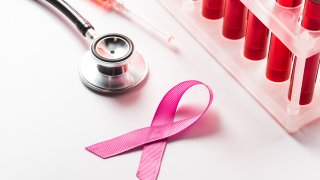
Dr. Kara Bernstein, Professor of Biochemistry and Biophysics at the Perelman School of Medicine, University of Pennsylvania, was awarded a $100,000 grant from the Pennsylvania Breast Cancer Coalition.
Dr. Bernstein will use the funding to study the RAD51C gene and how mutations of the gene can help to develop targeted therapies for breast cancer patients, specifically women facing triple-negative breast cancer.
Triple-negative breast cancer is an aggressive form of the disease and disproportionately affects Black and Latina women under 40.
Women do not begin routine breast cancer screenings, like mammograms, until the age of 40. Younger women are not offered screenings or may be denied screenings unless they have a genetic reason, a mutation, or discover a mass or other breast changes.
Get Philly local news, weather forecasts, sports and entertainment stories to your inbox. Sign up for NBC Philadelphia newsletters.
Rates of the disease are higher in Black and Latina women due to factors like higher breast density which makes it less likely to be screen-detected. Obesity and other health disparities that prevent access to adequate or affordable care also contribute to late-stage diagnoses.
Black women are more likely to die from breast cancer than any other group, are twice as likely to be diagnosed with triple-negative breast cancer, are diagnosed with later stage disease and have the lowest survival rates in each stage of diagnosis, according to breastcancer.org. Black women are also less likely to receive treatment that follows nationally recommended guidelines.
"Thinking about my personal relationship with cancer, I know how important this type of research would've been for my family and if I could do that for other families, to help them so they don't have to suffer these tremendous losses, the work is really important," Dr. Bernstein told NBC10's Yukare Nakayama.
Local
Breaking news and the stories that matter to your neighborhood.
The American Cancer Society states triple-negative breast cancer tends to grow quickly, is more likely to have spread at the time it’s found, and is more likely to come back after treatment than other types of breast cancer. Because of this, the mortality rates for triple-negative breast cancer are higher than they are for other types of breast cancer.
Triple-negative breast cancer makes up 10-15% of all breast cancers.
Sign up for our Breaking newsletter to get the most urgent news stories in your inbox.



